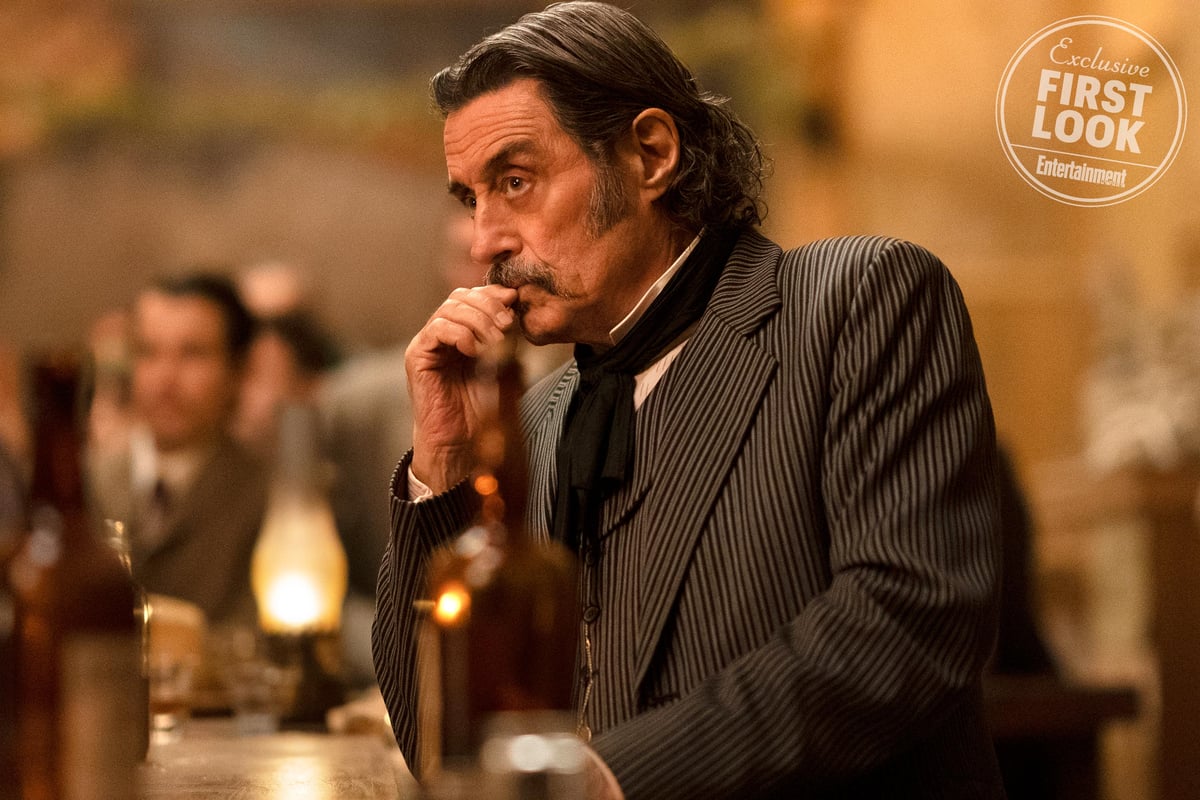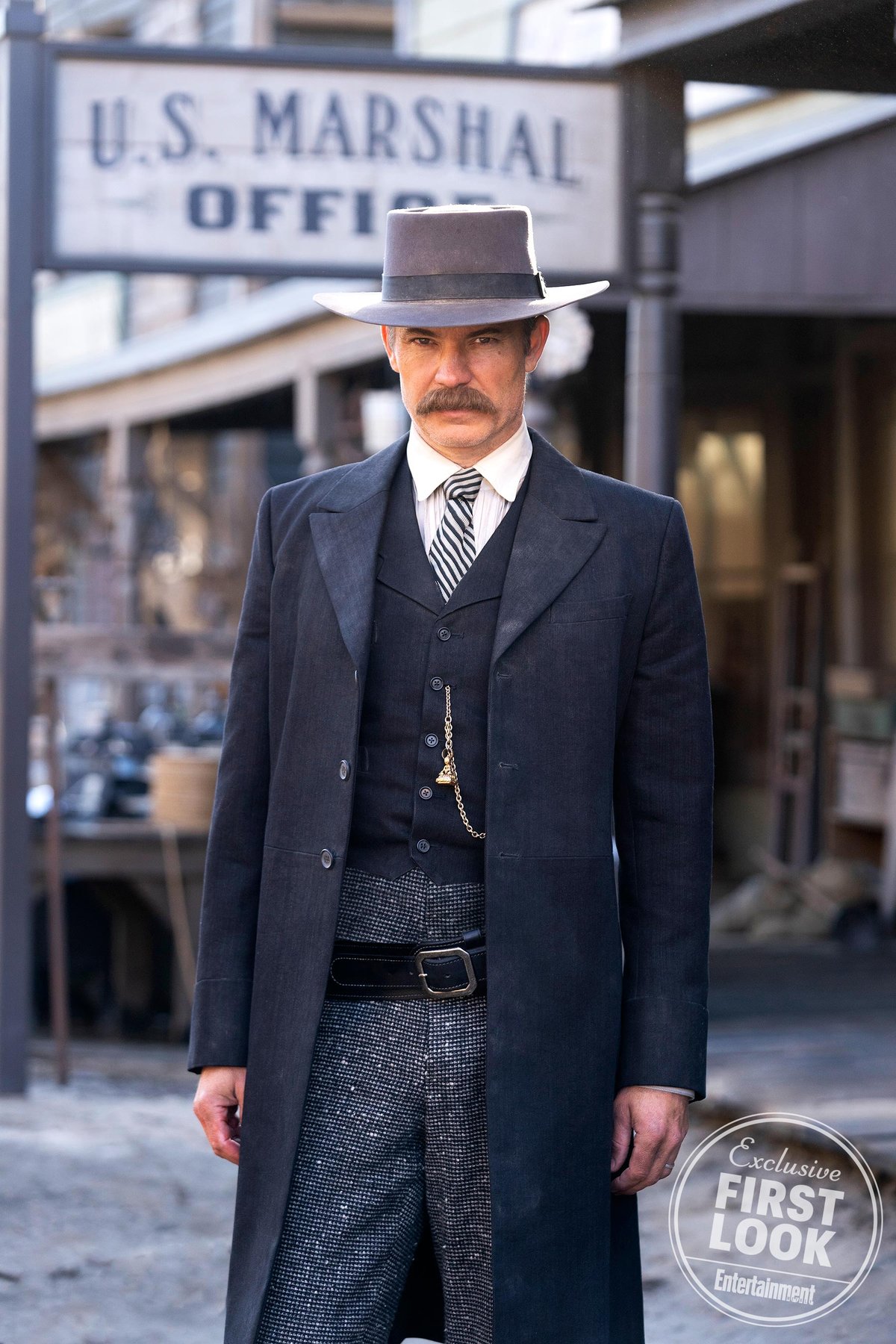Deadwood Returns

More than twelve years after the original, beloved TV series was cancelled, the Deadwood movie is very real. The entire core cast has been reassembled, shooting began this fall, and Entertainment Weekly has behind-the-scenes stills that are, well, very exciting.
That’s 76-year-old Ian McShane as barman Al Swearengen above, and below is Timothy Olyphant as now-venerable lawman Seth Bullock. Jesus, they both look great.

Producer Carolyn Strauss gives the following notes on where the Deadwood movie is taking these characters:
The movie is set in 1889 as the town prepares to celebrate South Dakota joining the Union as the 40th state. What’s the film about, basically?
If you ask David, it’s about the passage of time. The toll of time on people. It’s mellowed some people and hardened others. And it’s about the town’s maturing and becoming part of the Union and what that event sets in motion, in a very personal way for the people that it brings in town and what ensues. The toll of time has not just struck Deadwood and the characters but all the people making it as well, you get to see the faces of people 12 years later. And it was really profound. Actors were crying at the table read — not necessarily from the script but the emotion of being back and doing something we all loved doing so much. You normally have a great experience and then it’s over. You don’t normally get the chance to do this in life. It was kind of a gift.Al Swearengen was of the driver of much of the action in the series, can you give us a sense of what he’s up to?
The time has taken its greatest toll on Swearengen. He’s the person who really drove so much of the life of the town and there’s a sense of that power waning somewhat, and what ensues of that is a big part of the story.
I can go back and forth on the relative “greatest TV show ever” merits of The Wire or The Sopranos, but Deadwood is the show that’s meant the most to me. I’ll always contend that the first season is the best single season of television ever. And the scene below, when Bullock confronts Alma Garrett’s reprobate father who’s out to steal her gold mine, is the single greatest sequence in television history.
It’s just so magnificently constructed. The wordless, claustrophobic tension, as seemingly the entire town (except Al — Al’s not leaving his bar) intuits that lightning is about to strike in the middle of their camp. The actors’ wordless gestures to each other, that convey so much care and nervous energy. The artful cutting from one part of town to the next, without ever breaking from the overall impression that everything is happening in real time. The barely concealed sexuality of it all, in the middle of the violence. And the beautiful use of rack focus, as single shots flip from one character’s reaction to another. It’s claustrophobic and expansive all at once.
And as Joanie Stubbs tells Alma later, “if he was here, I’d wish a beating on my daddy mornings and evenings like your pa took today.”
I have a quote that I’ve kept in my Twitter bio for years. “Everything changes — don’t be afraid.” It’s a motto I’ve tried to live my life by, and it is, of course, from Deadwood.
Another scene that’s meant a lot to me is Reverend Smith’s quoting from 1 Corinthians at Wild Bill Hickok’s funeral. “For the body is not one member, but many” becomes, in David Milch’s reworking, a spiritually animated philosophy of community. It is a politics, and a form of politics we would do well not to forget.
The New Yorker’s 2005 profile of writer/creator/showrunner/polymath David Milch is one of my favorite pieces ever to appear in the magazine. It does an outstanding job of expanding on the philosophy encapsulated in the Reverend’s speech:
When Milch speaks, it’s with a natural storyteller’s alert, legato fluidity. His hands stay busy and he projects a cerebral intensity. He has brown eyes, a wide mouth, a strong nose, dark hair that he refuses to let go gray—he turns sixty this year—and the pale fleshiness of someone who doesn’t expose himself much to sunlight. “There’s a story by Hawthorne, ‘Ethan Brand,’ about a man who goes out looking for the unpardonable sin,” he continued. “He discovers that it’s the violation of the sanctity of another person’s heart. To use an instrument to open up another person without a loving, terrified humility is the unpardonable sin. That’s what medicine does, and Cochran has done it too much. At the beginning, he falls back on his fear. But then, in apprehending for just a moment the suffering of the others in the room with Swearengen, he’s able to go past it and he finds that the minute one person is brave the spirit comes alive. What I’m trying to suggest to the actors is that the modern situation is predicated upon the illusion of the self’s isolation—that business of ‘I’m alone, you’re alone, we can bullshit each other when we’re fucking or whatever else, but the truth is we’re alone. Right?’ Well, I believe that that is fundamentally an illusion.”
The Deadwood movie is now easily my most anticipated movie/TV show/anything of 2019.





Stay Connected